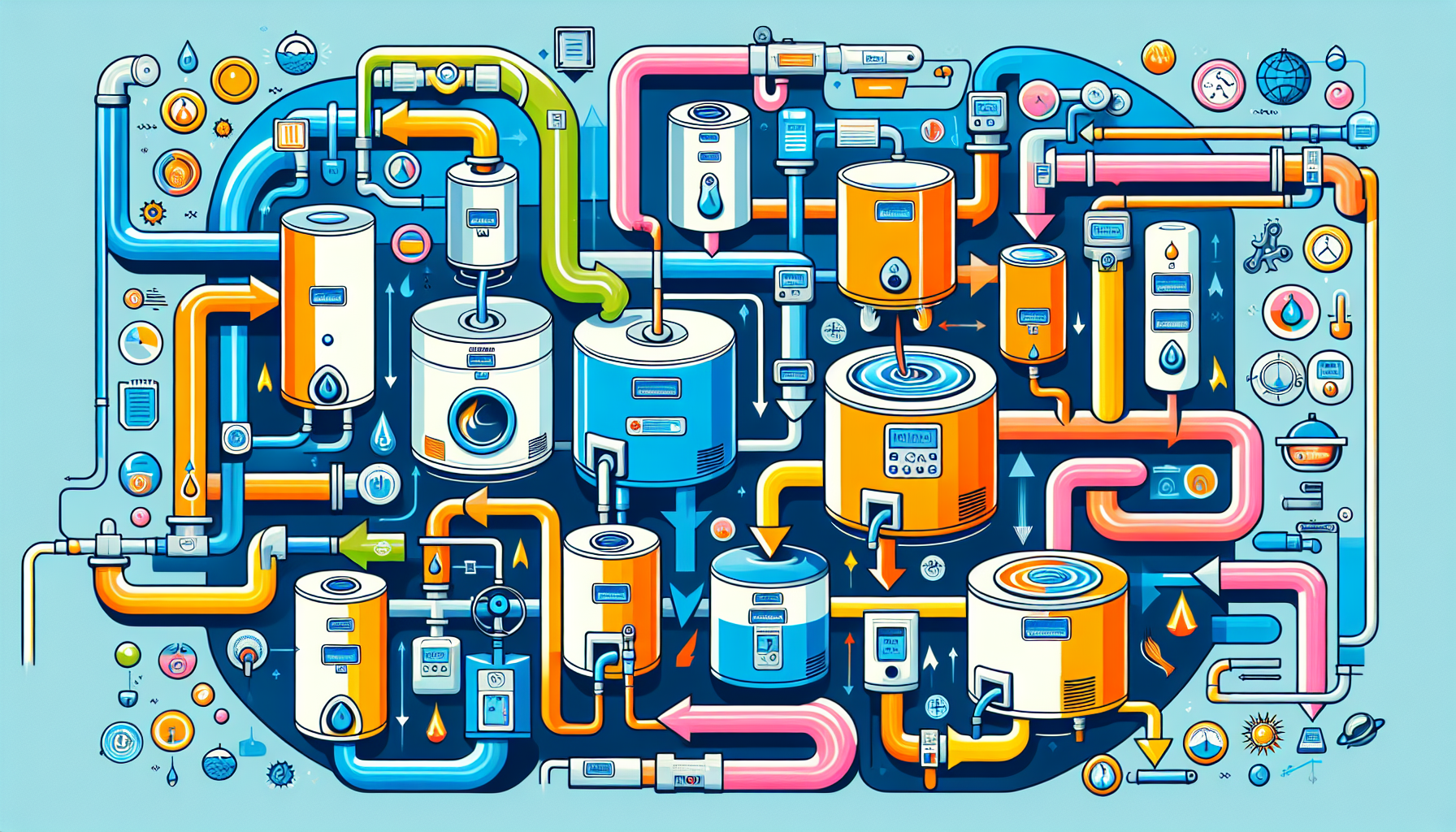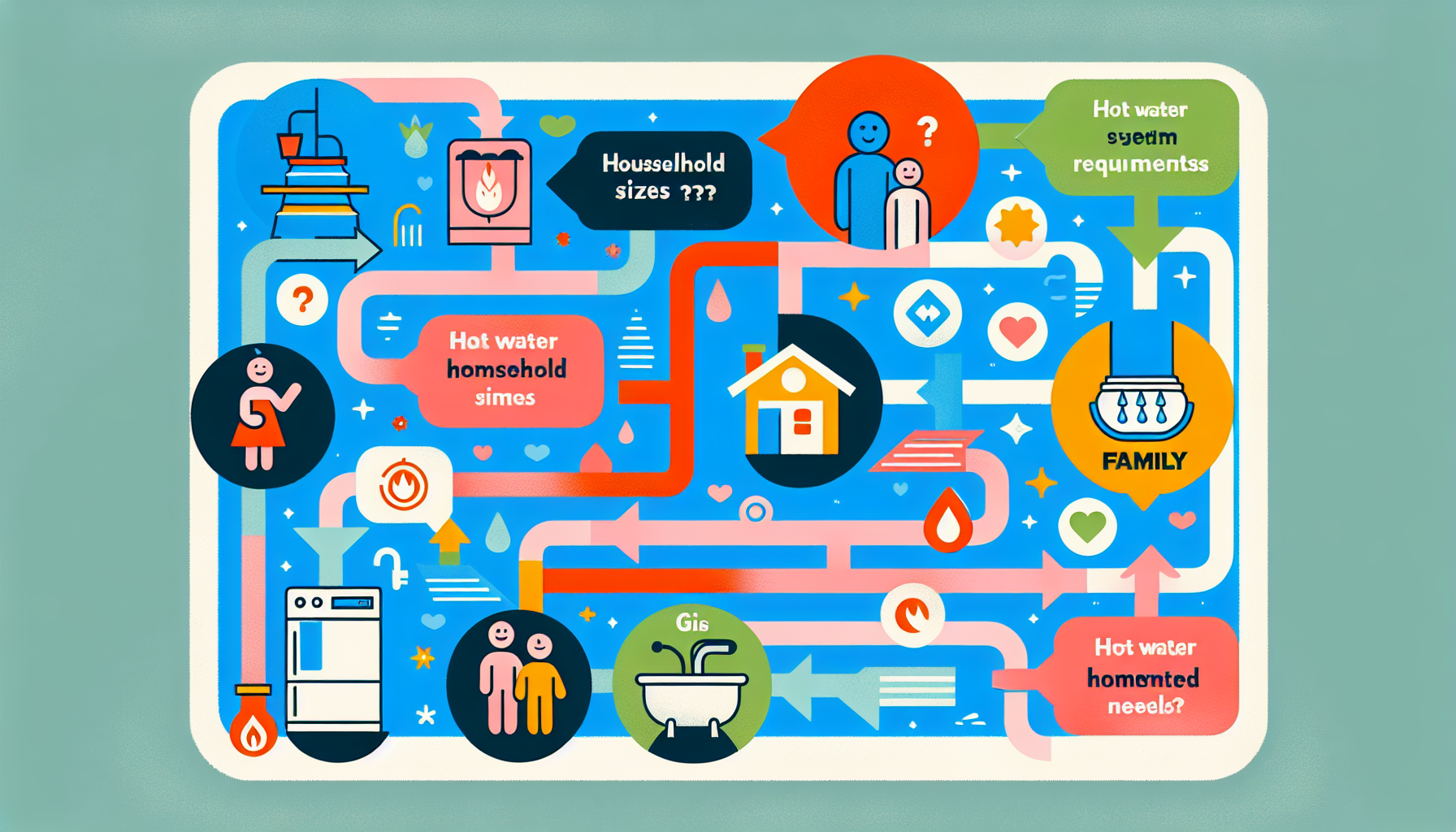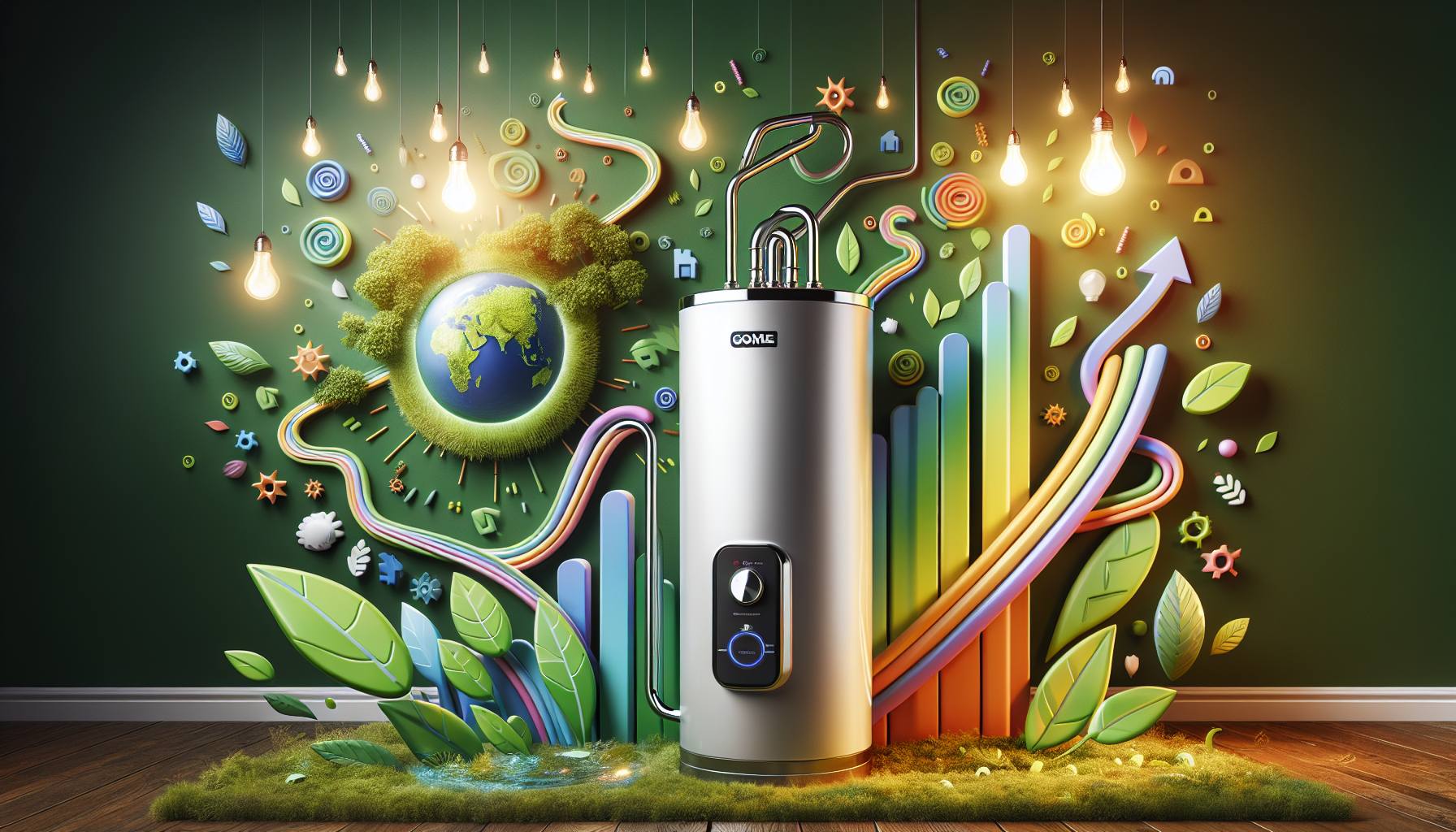Top Gas Water Heating System Solutions | Efficient & Affordable
Thinking about a gas water heating system? This guide will explain the benefits, types, and key factors to consider when choosing the perfect system for your home. Let’s get started on finding the best option for you.
Key Takeaways
-
Gas water heating systems provide reliable, continuous hot water supply, making them suitable for households with high usage needs.
-
The three main types of gas water heaters—tankless, storage tank, and hybrid—offer unique benefits catering to different household hot water requirements.
-
Upgrading to gas water heaters can lead to significant long-term savings and increased energy efficiency compared to electric models.
Understanding Gas Water Heating Systems

Gas hot water systems are designed to provide a reliable and efficient supply of hot water by using natural gas as their primary energy source. Unlike electric hot water systems, which rely on a 240-volt supply, gas water heaters use a gas burner to heat water as it flows through the system. When a hot water tap is turned on, a flow sensor triggers the ignition of the burner, ensuring that the water is heated instantly. This process ensures continuous flow hot water, so you’ll never run out during your shower or bath.
Before:
The core components of a gas hot water system include the heat exchanger, gas burner, and electronic control unit (ECU). The heat exchanger features a serpentine pathway that maximizes heat absorption. The ECU manages crucial functions such as temperature control, gas flow, ignition, and safety features. Additionally, some advanced systems can even operate during power outages by using a water turbine for ignition. This guarantees access to hot water, even during power outages.
After:
The core components of a gas hot water system include:
-
The heat exchanger, which features a serpentine pathway that maximizes heat absorption
-
The gas burner
-
The electronic control unit (ECU), which manages crucial functions such as temperature control, gas flow, ignition, and safety features
Additionally, some advanced systems can even operate during power outages by using a water turbine for ignition. This guarantees access to hot water, even during power outages.
One of the most significant advantages of gas hot water systems is their ability to provide hot water continuously without the need for a large storage tank. For households with high hot water usage, this eliminates the waiting time associated with reheating a tank of water. Additionally, the thermostat adjusts the gas flow to maintain the desired water temperature, providing a consistent and comfortable experience whenever you use the hot water tap.
Benefits of Gas Water Heating Systems

Gas hot water systems offer numerous benefits that make them a popular choice for many households. One of the primary advantages is their economic efficiency. Generally, gas water heaters are more economical due to lower gas prices, resulting in longer lifespans and reduced energy consumption, making them ideal for budget-conscious homeowners.
Another significant benefit is the ability of gas water heaters to handle multiple hot water uses simultaneously without significant temperature drops. You can run the dishwasher, take a shower, and do laundry simultaneously without worrying about running out of hot water. This capability is particularly advantageous for larger families or homes with high hot water needs.
Gas water heaters heat water much faster than electric models, providing almost instant hot water. This rapid heating capability is facilitated by the gas burner, which can quickly raise the temperature of the water as it flows through the system. Additionally, gas hot water units are known for their reliability, ensuring that you always have access to hot water whenever you need it.
Energy efficiency is another crucial factor to consider. Gas hot water systems are often more energy-efficient than electric hot water systems, leading to lower energy bills and a reduced environmental impact. The continuous flow hot water systems, in particular, only heat water when needed, reducing energy waste and improving overall efficiency.
This greater energy efficiency not only benefits your wallet but also contributes to a more sustainable and eco-friendly household.
Types of Gas Water Heating Systems
Gas water heating systems come in various types, each designed to meet different household needs and preferences. The three main categories are tankless gas water heaters, storage tank gas water heaters, and hybrid gas water heaters. Each type offers unique benefits and features that can cater to specific hot water requirements and usage patterns.
Knowing the differences between these systems helps in making an informed decision. Tankless gas water heaters, for instance, are known for their energy efficiency and space-saving design. Storage tank gas water heaters, on the other hand, offer high flow rates and are suitable for homes with consistent hot water demand.
Hybrid gas water heaters combine the best features of both tankless and storage systems, providing flexibility and enhanced efficiency. Each type has specific benefits and features that cater to different needs.
Tankless Gas Water Heaters
Tankless gas water heaters, also known as instantaneous systems, heat water on demand without the need for a storage tank. Turning on a hot water tap causes cold water to flow through the unit, where a gas burner rapidly heats it to the desired temperature. This process ensures a continuous supply of hot water, making it an excellent choice for households with varying hot water usage patterns.
One of the standout features of tankless gas water heaters is their compact size. These units take up significantly less space compared to traditional storage tanks, making them ideal for homes with limited space. Tankless systems are highly energy-efficient as they only heat water when needed, reducing heat losses and lowering energy bills. This efficiency can result in substantial savings over the unit’s lifespan.
Tankless gas water heaters are also known for their durability and longevity. Many tankless models can last over 20 years with proper maintenance, making them a long-term investment for your home. These systems also contribute to environmental sustainability by reducing greenhouse gas emissions from water heating. Whether you use natural gas or propane, tankless water heaters offer an efficient and eco-friendly solution for your hot water needs.
Storage Tank Gas Water Heaters
Storage tank gas water heaters are traditional systems that store and heat a large volume of water in a tank. These systems operate on a pressure-based mechanism, which allows them to provide high flow rates, making them efficient for households. They are particularly suitable for homes with consistent hot water usage, as they can maintain a steady supply even during peak demand times, similar to a gas storage system.
One of the advantages of storage tank systems is their suitability for small homes. These units are less intrusive and take up less space compared to electric hot water systems. For example, a standard storage tank with a capacity of 155 liters can meet the hot water needs of a typical household without running out of hot water. This makes them a reliable choice for ensuring continuous hot water supply.
In terms of energy efficiency, gas storage water heaters have advanced features such as twice-burnt gases and low-flue products, which enhance their recovery rates and reduce energy consumption. These features ensure efficient heating of the water in the storage tank, minimizing heat losses and improving overall performance.
For households with 1-3 people and one water outlet, a flow rate of 16 liters per minute is typically sufficient to deliver reliable hot water.
Hybrid Gas Water Heaters
Hybrid gas water heaters combine the best features of tankless and storage systems, offering flexibility in hot water delivery. These systems are designed to provide the efficiency and space-saving benefits of tankless heaters while maintaining the capacity and convenience of storage tanks. This hybrid approach provides a continuous supply of hot water while optimizing energy usage.
One of the key features of hybrid gas water heaters is the incorporation of condensing models, which include a secondary heat exchanger. The secondary heat exchanger pre-heats incoming water using exhaust heat, enhancing the system’s energy efficiency.
By utilizing the heat that would otherwise be wasted, hybrid systems can significantly reduce energy consumption and lower utility bills. This makes them an excellent choice for homeowners looking for an efficient and reliable hot water solution.
Choosing the Right Gas Water Heating System

Choosing the right gas water heating system requires considering several critical factors to meet your household’s specific needs. The main factors to consider include household size, hot water usage, and budget. Evaluate how much hot water your household uses and the number of fixtures that may operate simultaneously. This evaluation will help you choose a hot water system that can efficiently handle your daily demands.
Budget considerations also play a significant role in the decision-making process. Comparing the initial costs of different systems, along with their long-term operating expenses, is vital to ensure you make a cost-effective choice. Understanding the installation requirements and preparing your home are crucial steps in selecting the right system.
Let’s explore these considerations in more detail.
Household Size and Hot Water Usage
The size of your household and your typical hot water usage are primary factors in choosing the right gas water heating system. The demand for hot water increases with the number of people in the household and the frequency of simultaneous usage of multiple fixtures. For instance, larger households with several bathrooms and appliances that use hot water will require a system with a higher flow rate and capacity to ensure a reliable supply.
Minimizing the distance between the water heater and the hot water outlet reduces water and gas consumption. Proper placement enhances efficiency and reduces heat losses, ensuring quick hot water delivery without wasting energy.
By carefully assessing your household’s hot water needs and usage patterns, you can select a system that provides optimal performance and efficiency.
Budget Considerations
Budget considerations are crucial when selecting a gas water heating system. The cost range for gas hot water systems typically falls between $750 to $1900, depending on the model and features. Installation costs for instantaneous gas hot water systems can start from $300, with the total cost varying based on the complexity of the installation and location. While the upfront cost of instant gas hot water systems is generally higher compared to traditional tank systems, the long-term savings on energy bills can offset this initial investment.
When evaluating options, consider both the initial purchase price and long-term operating costs. Instantaneous gas hot water systems, for example, may have higher upfront costs but offer significant savings over time due to their energy efficiency.
Many providers also offer interest-free payment plans and flexible financing options, making it easier to manage the financial aspect of upgrading to a new gas water heater. By carefully planning your budget and considering all associated costs, you can make an informed and cost-effective decision.
Installation Requirements
Proper installation of gas water heaters ensures safety and efficiency. One of the critical aspects to consider is adequate ventilation, which is necessary to safely expel harmful combustion gases and prevent dangerous fume buildup. Proper venting systems must be carefully assembled to channel exhaust gases outside, complying with local building codes and safety standards. Proper ventilation around the installation area is crucial for maintaining efficiency and safety.
The installation process for gas water heaters is more complex than for electric models due to the need for gas line connections and proper ventilation. This complexity requires professional installation to ensure all aspects of the system are correctly set up. It’s also essential to evaluate the availability of a suitable gas supply and ensure the existing infrastructure can support the new system.
Installation Process for Gas Water Heaters
The installation process for gas water heaters requires careful planning and execution to ensure optimal performance and safety. Homeowners should know what to expect during installation, including connecting gas lines, ensuring adequate ventilation, and conducting system tests. Knowing these steps can help you prepare for a smooth and efficient installation process.
Professional installation is recommended for gas water heaters to guarantee all components are correctly connected and functioning. This process includes preparing your home for installation and following detailed steps by a qualified professional. Proper installation ensures efficient operation and extends the system’s lifespan and reliability.
Preparing Your Home for Installation
Preparing your home for gas water heater installation ensures a smooth and safe setup. The gas hot water tank can be located near the washing machine, in the garage, or on the exterior of the home. Ensuring proper ventilation is crucial, as it allows for the safe expulsion of combustion gases and maintains safety standards.
The initial operation involves filling the tank, releasing air via a hot water faucet, and igniting the pilot light. Additionally, it’s important to ensure that the installation area complies with local building codes and provides easy access for maintenance.
Evaluating the water pressure and ensuring the availability of a gas supply are also crucial steps before the installation begins. Thoroughly preparing your home facilitates a smoother installation process and enhances the efficiency and safety of your gas water heater.
Professional Installation Steps
The professional installation of a gas water heater involves several detailed steps to ensure the system operates efficiently and safely. A qualified professional will start by connecting the new system to the gas line, ensuring all connections are secure. After connecting the gas line, a leak test using a soap solution is conducted to check for any leaks. This step is crucial for preventing potential hazards and ensuring the system’s safety.
Once the gas line is secure and leak-free, the installation proceeds with testing the hot water operation at various faucets to ensure proper functionality. If a mandatory tempering valve is not already present, it will be installed, which can increase the installation costs but is necessary for safety.
By following these professional installation steps, you can ensure that your gas water heater is set up correctly and ready to provide reliable hot water.
Maintenance Tips for Gas Water Heating Systems

Regular maintenance is crucial for gas water heating systems to ensure their longevity and efficient operation. Gas hot water systems typically have a lifespan of up to 12 years, but with proper maintenance, they can last even longer. Scheduling regular maintenance helps identify and fix potential issues early, ensuring the system operates at peak efficiency.
Maintenance services for gas hot water systems often include repair recommendations, new system guidance, and regular maintenance scheduling. A routine maintenance plan can significantly extend the lifespan of your hot water system and ensure reliable hot water.
Here are some regular maintenance routines and troubleshooting tips to keep your system in top shape.
Regular Maintenance Routines
Routine maintenance checks should be conducted every five years to assess the overall health of your gas water heating system.
Here are some key steps to follow during the maintenance check:
-
Inspect all connections for leaks.
-
Ensure the water heater functions correctly at the set temperature after initial heating.
-
Check the temperature and pressure relief valves every six months to prevent potential hazards.
By following these steps, you can help ensure the longevity and safety of your gas water heating system.
Maintaining the ideal operation temperature of 60°C can prevent scalding and ensure the system operates efficiently. Hard water can necessitate more regular maintenance, as mineral deposits can affect the system’s performance.
Following these regular check-ups and maintenance tasks can significantly extend the lifespan of your hot water system and maintain its efficiency.
Troubleshooting Common Issues
Common issues with gas water heaters, such as frequent temperature fluctuations, may signal a malfunction in the system. Flushing the system helps clear mineral deposits that can cause performance issues and ensure the water heater operates efficiently. Replace the sacrificial anode every five years to prevent rust and maintain proper operation.
To avoid the ‘cold water sandwich’ issue, where cold water is experienced between bursts of hot water, limit consecutive uses of the hot water system. By addressing these common issues and implementing regular maintenance routines, you can ensure your gas water heater continues to provide reliable and efficient hot water.
Energy Efficiency and Savings with Gas Water Heaters

Gas water heating systems are known for their energy efficiency, leading to significant cost savings over time. These systems are more efficient than electric models due to superior heat transfer in the combustion process, resulting in lower energy waste. Upgrading to modern gas water heaters can greatly reduce overall energy expenses and lower energy bills.
Furthermore, gas water heaters often produce fewer emissions compared to electric water heaters, contributing to a lower carbon footprint. Tankless gas water heaters, in particular, can reduce greenhouse gas emissions by up to 75% compared to electric storage water heaters.
Regular maintenance can enhance energy efficiency and help lower utility costs, making gas water heaters an environmentally friendly and cost-effective choice.
Energy Ratings and Labels
Energy star labels provide a standardized way to evaluate the efficiency of gas water heating systems, helping consumers make informed choices. Models with higher energy ratings consume less energy and lower energy bills. These labels indicate the system’s energy efficiency and the gas energy rating label, allowing you to compare different models and select the most efficient one for your needs.
When shopping for a new gas water heater, choose systems with higher energy ratings to maximize savings. By selecting a model with a high energy star rating, you can ensure that your water heater operates efficiently and minimizes energy waste. This not only benefits your wallet but also contributes to a more sustainable household.
Long-term Savings
Gas water heaters offer long-term savings, making them an attractive option for households. Households can save around $750 each year. This is possible by switching from an electric storage unit to a natural gas instant system. The long-term savings come from the lower operational costs of gas systems compared to electric models.
Additionally, the placement and location of the gas hot water system can influence its running costs. By optimizing the placement and ensuring efficient operation, you can further reduce energy consumption and lower utility bills.
Gas water heaters offer reliable and predictable expenses, making them a cost-effective long-term choice.
Upgrading to a Gas Water Heating System
Upgrading to a gas hot water system can significantly enhance your home’s energy efficiency and reduce energy consumption. Switching from a storage tank system to an instantaneous gas water system eliminates heat losses and provides hot water on demand, enhancing energy efficiency. The long-term benefits of installing an instantaneous gas water system include sustained savings and reduced energy bills.
When comparing gas and electric water heaters, gas systems typically offer lower operational costs and faster heating capabilities. Switching to a gas water heater may involve higher upfront costs, but the long-term savings on energy bills make it a worthwhile investment.
By understanding the benefits and preparing for the transition, you can smoothly upgrade to a more efficient and cost-effective hot water solution.
Comparing Gas vs. Electric Water Heaters
Over their lifespan, gas water heaters generally have lower operational costs compared to electric alternatives. This is due to the lower price of natural gas and the higher efficiency of gas burners in heating water. Additionally, gas hot water systems can heat water much faster than electric models, providing a continuous supply of hot water without the wait time associated with electric heaters.
Switching from electric storage units to gas systems can save around $750 each year. These savings, combined with the enhanced performance and reliability of gas systems, make them an excellent choice for homeowners looking to upgrade their water heating solution.
Comparing the efficiency, cost, and performance of both types helps you make an informed decision that best suits your household’s needs.
Transitioning Smoothly
Transitioning to an instantaneous gas water heater may involve a higher upfront installation cost, but the long-term benefits far outweigh this initial expense. To ensure a smooth transition, work with a qualified professional who can handle the installation and adjust your home’s infrastructure as needed. This will help you avoid potential issues and ensure the system operates efficiently from day one.
Careful planning and understanding the benefits can ensure a seamless upgrade to a gas water heating system. The perfect temperature and efficient hot water supply will enhance your daily comfort and provide reliable performance for years to come.
Embrace the efficiency and convenience of gas water heaters to enjoy continuous hot water at a lower cost.
Payment and Financing Options
Upgrading to a gas water heating system can be a significant investment, but various payment and financing options can make it more affordable. Many providers offer interest-free financing plans, allowing homeowners to upgrade without immediate large payments. These plans help manage upgrade costs, ensuring you enjoy the benefits of a new gas water heater without financial strain.
By exploring the available financing options, you can find a plan that suits your budget and needs. Whether you choose an interest-free plan or another financing option, it’s important to understand the terms and conditions to make an informed decision.
Let’s delve into the specifics of interest-free financing plans and effective budget planning.
Interest-Free Financing Plans
Interest-free financing plans enable homeowners to upgrade their gas water heating systems without immediate large payments. These plans spread the cost over a set period, making it more manageable and affordable. Financing options help customers avoid large upfront payments and better manage household budgets.
When using interest-free financing for hot water system upgrades, customers must be aware that financing is subject to approval and specific terms. Additionally, it’s important to remain mindful of the end date for any time-limited offers related to financing hot water systems.
By taking advantage of these financing plans, you can upgrade to a more efficient gas water heater without disrupting your financial stability.
Budget Planning
Effective budget planning is crucial when upgrading to a gas water heating system. Many providers offer interest-free financing plans that help customers afford the upfront costs of a gas water heater. These plans typically have approval requirements and specific conditions that customers should be mindful of. Fast approval processes for financing applications can often provide customers with quick access to funding for their gas water heater purchase.
When planning your budget, consider both the purchase price and installation costs to manage expenses effectively. Carefully evaluating your financial situation and exploring financing options can help you make an informed decision that aligns with your budget and hot water needs.
Proper budget planning ensures you can enjoy the benefits of a new gas water heater without financial stress.
Summary
Gas water heating systems offer a reliable, efficient, and cost-effective solution for meeting your household’s hot water needs. By understanding the different types of gas water heaters, their benefits, and the factors to consider when choosing and installing one, you can make an informed decision that enhances your home’s comfort and efficiency. Embrace the advantages of gas water heaters and enjoy continuous hot water while saving on energy costs. Take the first step towards a more efficient and sustainable home today with InstalledToday.
Frequently Asked Questions
What are the main benefits of gas water heating systems?
Gas water heating systems offer economical, reliable, and energy-efficient solutions, providing continuous hot water while managing multiple uses simultaneously. Additionally, they help reduce energy bills thanks to efficient heat transfer and lower gas prices.
How do tankless gas water heaters work?
Tankless gas water heaters provide continuous hot water by heating it on demand with a gas burner. When you turn on a hot water tap, cold water flows through the unit and is rapidly heated. This eliminates the need for a storage tank, ensuring you have hot water whenever you need it.
What should I consider when choosing a gas water heating system?
When choosing a gas water heating system, it's crucial to assess your household size, hot water usage, budget, and installation requirements. Focus on the system's capacity, flow rate, and energy efficiency to ensure it aligns with your needs.
How can I maintain my gas water heating system for optimal performance?
To maintain optimal performance of your gas water heating system, regularly check for leaks, inspect the temperature and pressure relief valves, flush the system to remove mineral deposits, and replace the sacrificial anode every five years to prevent rust. Following these steps will help ensure your system operates efficiently and lasts longer.
Are there financing options available for upgrading to a gas water heating system?
Yes, interest-free financing options are available from many providers, allowing you to manage the cost of upgrading to a gas water heating system more affordably. This enables you to spread the expense over a set period for better financial ease.


























